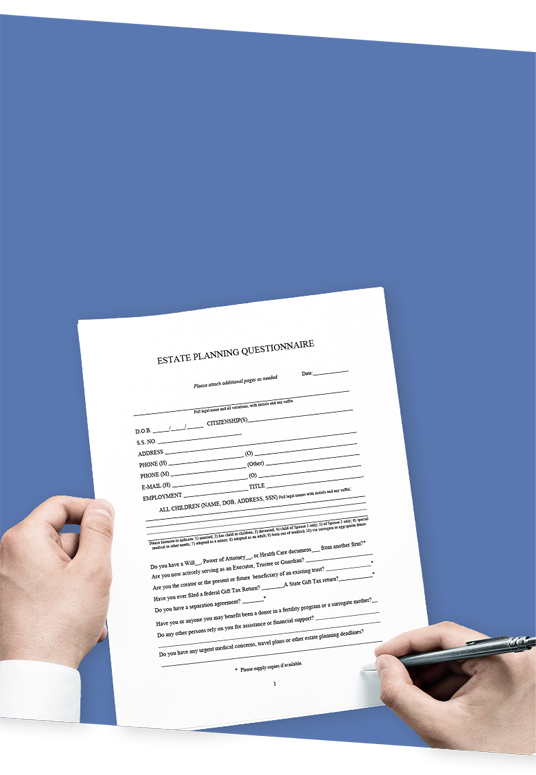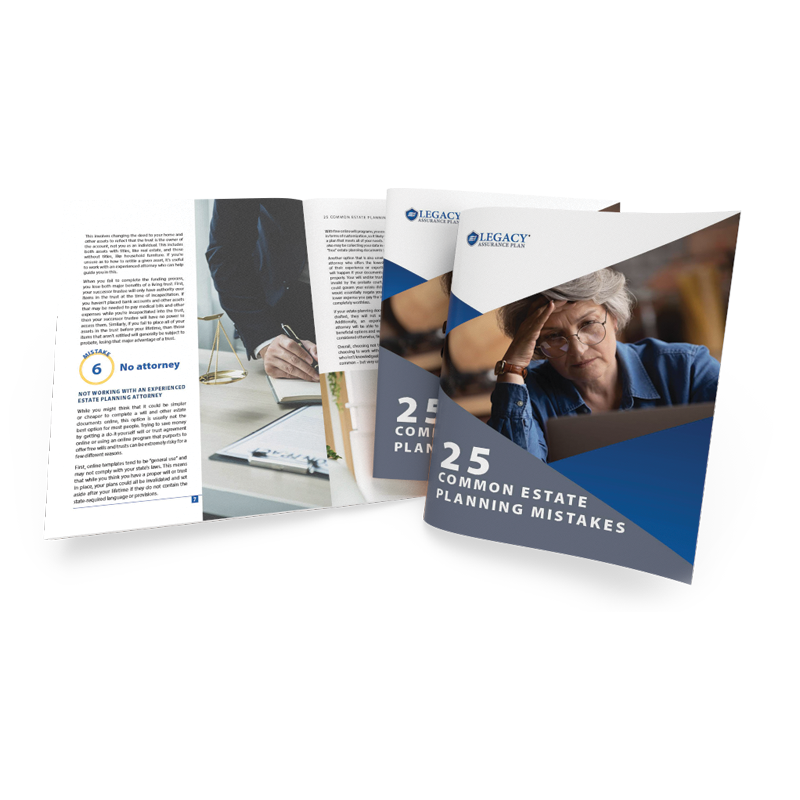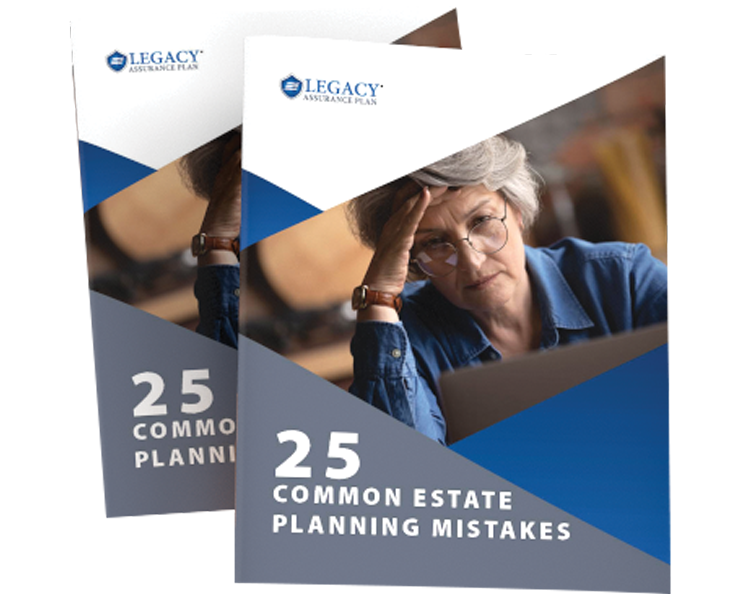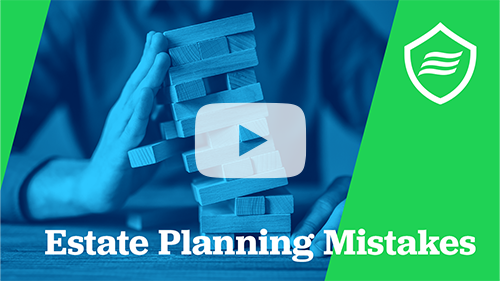ESTATE PLANNING
Estate Planning Mistakes
Estate planning errors can have far-reaching consequences for your loved ones, potentially leading to family conflicts, excessive taxation, and lengthy probate proceedings. According to research by Caring.com, only 33% of American adults have estate planning documents in place, leaving the majority vulnerable to critical estate planning mistakes. Understanding these potential pitfalls is essential for creating an effective estate plan that truly protects your legacy and provides for your beneficiaries according to your wishes.
For those seeking comprehensive solutions to these common estate planning pitfalls, our detailed guide offers expert strategies and practical steps to safeguard your legacy.
Estate Planning Mistake #1
— Failing to Create an Estate Plan
Perhaps the most fundamental estate planning mistake is not having a plan at all. Many people postpone estate planning, believing they have plenty of time or that it's only necessary for the wealthy. Statistics show that approximately 68% of Americans die without a will, subjecting their estates to default state laws that may not align with their wishes.
Without an estate plan in place, you risk:
- Your assets being distributed according to state intestacy laws rather than your wishes
- The court appointing a guardian for minor children without your input
- Increased probate costs and potential family disputes
- Higher estate taxes that could have been minimized or avoided
- Loss of privacy as probate proceedings become part of the public record
Estate Planning Mistake #2
— Not Updating Your Estate
Plan After Major
Life Events
Creating an estate plan isn't a one-time event. Your estate plan should evolve with your life circumstances, yet many people create documents and then file them away, never to be revisited. Studies indicate that over 90% of estate plans become outdated within 5 years due to changes in personal circumstances, financial situations, or laws.
Failing to update your estate plan after significant life changes can lead to:
- Ex-spouses potentially inheriting assets
- Newborn children or grandchildren being unintentionally excluded
- Outdated beneficiary designations that conflict with your current wishes
- Recently acquired assets not being properly addressed in your plan
- Changes in tax laws rendering your strategies less effective
Studies indicate that over 90% of estate plans become outdated within 5 years


Estate Planning Mistake #3
— Improper Beneficiary Designations
Beneficiary designations on retirement accounts, life insurance policies, and other financial instruments override your will. This critical detail is often overlooked in the estate planning process. A study by the U.S. Treasury Department revealed that over $38 billion in retirement benefits is unclaimed, largely due to outdated or missing beneficiary designations.
Mistakes with beneficiary designations can result in:
- Assets going to unintended recipients despite what your will states
- Potential tax complications for beneficiaries
- Probate delays and additional expenses
- Accidental disinheritance of intended heirs
- Disabled beneficiaries potentially losing government benefits
Estate Planning Mistake #4
— Overlooking Power of Attorney
Documents
Many people focus exclusively on wills and trusts while neglecting crucial power of attorney documents for financial and health care decisions. Research indicates that a majority of Americans lack the proper incapacity planning documents, leaving them vulnerable to court intervention in personal matters.
Without proper power of attorney arrangements:
- Your family may need court intervention to manage your affairs if you become incapacitated
- Medical decisions might not align with your preferences
- Financial matters could remain unaddressed during periods of incapacity
- Your loved ones might face additional stress and legal hurdles during already difficult times
- Business interests and investments could suffer from lack of management

Estate Planning Mistake #5
— Poor Planning for Incapacity
Estate planning isn't only about what happens after death — it's also about preparing for potential incapacity during your lifetime. This aspect is frequently neglected, yet the Department of Health & Human Services reports that 70% of people over 65 will require some form of long-term care in their lifetime.
Inadequate incapacity planning can lead to:
- Guardianship proceedings that are costly and time-consuming
- Health care decisions made contrary to your wishes
- Family conflicts over who should make decisions on your behalf
- Financial hardships due to inability to access or manage assets
- Potential for elder abuse or exploitation without proper oversight
Estate Planning Mistake #6
— Improper Trust Funding
Creating a trust without properly funding it is like building a safe but never putting anything inside. Many people establish trusts but fail to retitle assets in the trust's name. Estate planning experts estimate that more than 70% of trusts are improperly or inadequately funded.
The consequences of unfunded or underfunded trusts include:
- Assets still subject to probate despite having a trust
- Trust provisions that cannot be carried out as intended
- Potential tax consequences that the trust was designed to avoid
- Invalidation of carefully crafted distribution plans
- Increased administrative costs to correct funding issues after death
Estate Planning Mistake #7
— Failing to Consider Estate
Taxes
While federal estate tax exemptions have increased in recent years, state estate taxes and future changes to tax law can still impact your estate. Many people don't adequately plan for potential tax burdens. According to tax experts, improper tax planning can reduce an inheritance by up to 40% through avoidable federal estate taxes alone.
Poor tax planning within your estate can result in:
- Unnecessary estate tax liabilities that reduce inheritances
- Forced sale of family assets to cover tax obligations
- Missed opportunities for charitable giving strategies that reduce tax exposure
- Inefficient transfer of wealth to future generations
- Failure to leverage generation-skipping strategies for multi-generational planning
Many people don't
adequately plan for
potential tax burdens


Estate Planning Mistake #8
— Neglecting to Plan for Long-Term Care
The potential need for long-term care represents a significant risk to your estate that many planning strategies fail to address adequately. The average annual cost of a private room in a nursing home exceeds $100,000, according to Genworth's Cost of Care Survey, potentially depleting an estate within a few years.
Without proper long-term care planning:
- Your retirement savings could be quickly depleted by care costs
- Family members might bear unexpected financial and caregiving burdens
- Medicaid qualification might require spending down assets that could have been protected
- Your standard of care may be limited by financial constraints
- The surviving spouse may face financial insecurity after care expenses
Estate Planning Mistake #9
— Unclear or Ambiguous Language in
Documents
Estate planning documents with vague language or contradictory provisions can create confusion and potential for disputes among beneficiaries. Legal experts report that ambiguous language is one of the leading causes of estate litigation, with contested wills taking an average of 1-2 years to resolve.
Ambiguous estate planning documents often lead to:
- Litigation between family members over asset distribution
- Delays in settling the estate as intentions are clarified
- Increased probate and administrative costs
- Distributions that don't align with your actual wishes
- Court interpretations that may not reflect your true intent
Estate Planning Mistake #10
— DIY Estate Planning Without
Professional Guidance
While online tools make do-it-yourself estate planning seem appealing, this approach often results in documents that fail to address your specific needs or comply with state laws. Studies show that approximately 60% of DIY wills contain serious errors or omissions that could render them invalid or ineffective.
The pitfalls of DIY estate planning include:
- Documents that may not be legally valid in your state
- Missed opportunities for tax savings or asset protection
- Failure to address complex family dynamics or business interests
- Unintended consequences due to lack of comprehensive planning
- Outdated strategies that don't account for current laws
GET YOUR FREE COPY
OF "25 COMMON ESTATE
PLANNING MISTAKES" TODAY!

Frequently Asked Questions
Q: How often should I review my estate plan?
You should review your estate plan at least every 3-5 years, but more importantly, after any significant life event such as marriage, divorce, birth of a child, death of a beneficiary, substantial change in assets, moving to a new state, or major tax law changes. Regular reviews help ensure your plan remains aligned with your current wishes and circumstances. Many estate planning professionals recommend scheduling annual reviews to catch any necessary updates promptly.
Q: What's the difference between a will and a trust?
A will is a legal document that directs how your assets should be distributed after death and goes through probate. A trust is a legal arrangement where assets are held by one party (trustee) for the benefit of another (beneficiary), often avoiding probate and providing more control over asset distribution. Trusts offer additional benefits including privacy, potential tax advantages, and provisions for incapacity planning that wills cannot provide. While wills become effective only at death, certain trusts can operate during your lifetime, offering flexibility for various situations.
Q: Can estate planning help reduce family conflicts after I'm gone?
Yes, thoughtful estate planning can significantly reduce family conflicts. Clear, well-documented instructions eliminate guesswork about your intentions. Communication about your plans, using tools like letters of instruction, and selecting appropriate fiduciaries can all help prevent disagreements. In some cases, including no-contest clauses or establishing independent trustees may further discourage disputes among beneficiaries. Studies show that estates with comprehensive, professional estate plans experience approximately 40% fewer legal challenges than those without proper planning.







